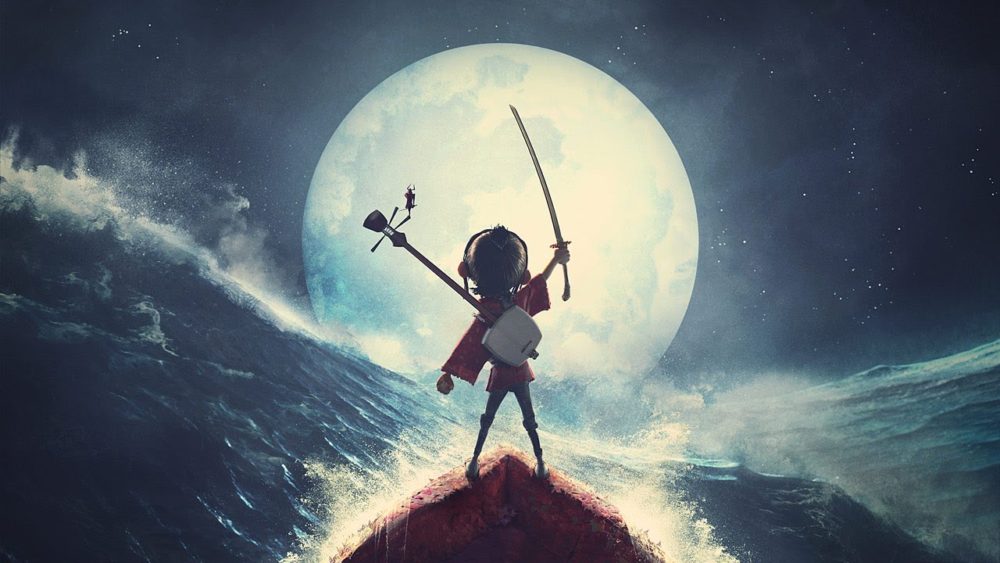
By the time Regina Spektor’s comforting but melancholy cover of “While My Guitar Gently Weeps” plays over 2D animated credits revealing the voice cast and crew of Kubo and the Two Strings, it’s likely you’ll have already let out a tear or two, much like the film’s titular protagonist. Or, hell, at least I did. Borrowing from the likes of Hayao Miyazaki and Akira Kurosawa in storytelling and culture (and to some extent Yasujirō Ozu—though never going the lengths Mamoru Hosoda’s masterpiece Wolf Children did), director Travis Knight, writers Marc Haimes and Chris Butler, and character designer Shannon Tindle not only offer up a compelling narrative, but set it in a world that feels genuinely lived in.
As fantastical as it is grounded in reality, Kubo tells the story of a fractured family, one loaded with history and adventure. The titular Kubo (Art Parkinson) spends his days reciting the tales his mother (Charlize Theron) has told him about his father by playing the shamisen to bring origami to life and his nights being her caretaker as she deals with dementia. She exists in this manner after her wicked sisters (Rooney Mara) and father, The Moon King (Ralph Fiennes), murdered her husband and took her son’s left eye. As expected of a hero’s journey tale, these antagonists return to their lives and Kubo is launched into an adventure to survive and defeat his grandfather.
It’s a heavy narrative, one punctuated with something that many blockbuster features take for granted: the permanence of death and the driving force that is true loss. Where Pixar works typically relegates its death to the start of a film, using its impact as set up, Laika injects Kubo with a maturity often not found in American films marketed to kids. Memory, the ability to shape it, and the inability to access it, is something that flows through Kubo’s every fiber and being, and pairing it with the metaphor of a young man quite literally reenacting lost memories through musical performance (courtesy of the inimitable Dario Marianelli) never comes across as heavy-handed.
The reason for that is that Kubo’s tale is as compellingly presented as it is written. Laika’s dedication to stop-motion filmmaking brings to life every riveting creature that the script offers up; a ship built entirely out of leaves, a sea of origami paper, undersea eyeballs that act as deadly sirens, and even a Ray Harryhausen style skeleton with swords drilled into its skull (whose massive model is showcased in a mid-credits sequence that inspires more excitement than any teaser Marvel or DC could ever compose). The film explodes with color more often than not and maintains a certain lighting even in its darkest moments to ensure that one never loses sight of the skill put into creating this world.
If a complaint must be made, it’s a minor one: the primarily white cast occasionally distracts from the beauty and dedication to getting Japan just right. Some voices work better than others, though all (with the exception of Parkinson) take some time to adjust to, and it’s the kind of thing that makes viewers accustomed to subtitled animation wish it was Japanese rather than English (though it’s hard to blame the filmmaker’s for working in their natural tongue when having to manually make every face and mouth piece match the words being said). Regardless of this detail, Laika has delivered their best work since Henry Selick’s masterful Coraline in a film that’s as exciting and emotional as anything Studio Ghibli’s made in a long time.
—
Directed by Travis Knight; screenplay by Marc Haimes & Chris Butler; story by Shannon Tindle & Marc Haimes; starring Art Parkinson, Charlize Theron, Matthew McConaughey, Ralph Fiennes, Rooney Mara, Brenda Vaccaro, Cary-Hiroyuki Tagawa, and George Takei; 101 minutes.
Kubo and the Two Strings is currently in theaters everywhere.



 Derek
Derek
 Isabelle
Isabelle